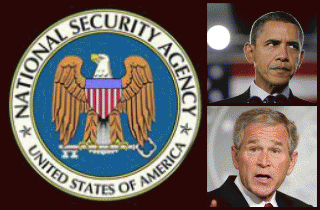The Obama administration for more than two years permitted the National Security Agency to continue collecting vast amounts of records detailing the email and internet usage of Americans, according to secret documents obtained by the Guardian.
The documents indicate that under the program, launched in 2001, a federal judge sitting on the secret surveillance panel called the Fisa court would approve a bulk collection order for internet metadata "every 90 days." A senior administration official confirmed the program, stating that it ended in 2011.
The collection of these records began under the Bush administration's wide-ranging warrantless surveillance program, collectively known by the NSA code name "Stellar Wind."
According to a top-secret draft report by the NSA's inspector general -- published for the first time today by the Guardian -- the agency began "collection of bulk internet metadata" involving "communications with at least one communicant outside the United States or for which no communicant was known to be a citizen of the United States."
Eventually, the NSA gained authority to "analyze communications metadata associated with United States persons and persons believed to be in the United States," according to a 2007 Justice Department memo, which is marked secret.
The Guardian revealed earlier this month that the NSA was collecting the call records of millions of US Verizon customers under a Fisa court order that, it later emerged, is renewed every 90 days. Similar orders are in place for other phone carriers.
Click Here to Read Whole Article
The internet metadata of the sort NSA collected for at least a decade details the accounts to which Americans sent emails and from which they received emails. It also details the internet protocol addresses (IP) used by people inside the United States when sending emails -- information which can reflect their physical location. It did not include the content of emails.
"The internet metadata collection program authorized by the Fisa court was discontinued in 2011 for operational and resource reasons and has not been restarted," Shawn Turner, the Obama administration's director of communications for National Intelligence, said in a statement to the Guardian.
"The program was discontinued by the executive branch as the result of an inter-agency review," Turner continued. He would not elaborate further.
But while that specific program has ended, additional secret NSA documents seen by the Guardian show that some collection of Americans' online records continues today. In December 2012, for example, the NSA launched one new program allowing it to analyze communications with one end inside the US, leading to a doubling of the amount of data passing through its filters.
What your email metadata reveals The Obama administration argues that its internal checks on NSA surveillance programs, as well as review by the Fisa court, protect Americans' privacy. Deputy attorney general James Cole defended the bulk collection of Americans' phone records as outside the scope of the fourth amendment's protections against unreasonable searches and seizures.
"Toll records, phone records like this, that don't include any content, are not covered by the fourth amendment because people don't have a reasonable expectation of privacy in who they called and when they called," Cole testified to the House intelligence committee on June 18. "That's something you show to the phone company. That's something you show to many, many people within the phone company on a regular basis."
But email metadata is different. Customers' data bills do not itemize online activity by detailing the addresses a customer emailed or the IP addresses from which customer devices accessed the internet.
Internal government documents describe how revealing these email records are. One 2008 document, signed by the US defense secretary and attorney general, states that the collection and subsequent analysis included "the information appearing on the 'to,' 'from' or 'bcc' lines of a standard email or other electronic communication" from Americans.






